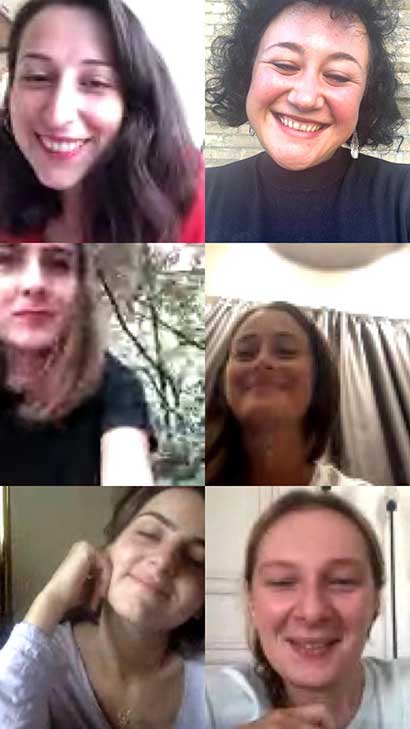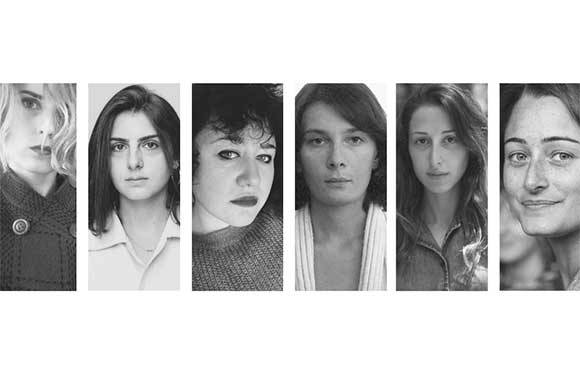Cinemas have not yet opened and a number of important cultural projects have been postponed. Months ago, a group of producers took the initiative to create production regulations, and general recommendations for this production were gradually developed in collaboration with various agencies.
The regulation document discusses the main recommendations to be followed during the film production process, the activities to be carried out on the set and additional services. FNE spoke to the producers about the crisis and their proposals.
FNE: A working group of film professionals was created to overcome the COVID crisis, from a cultural point of view. Who was involved in this process and what was their purpose?
Working Group: A working group of six Georgian female film producers emerged spontaneously during the Covid-19 pandemic with the aim to identify and overcome the key difficulties in the financing, producing, coproducing and distributing of Georgian cinema during the global emergency. The group consisted of Sophio Bendiashvili (Enkeny Films), Anna Dziapshipa (Sakdoc Film), Ketie Danelia (Takes Film), Nino Jincharadze (Takes Film), Tekla Machavariani (Nushi Films) and Elene Margvelashvili (Parachute Films), who actively collaborated with the Georgian National Film Center, industry professionals and local government institutions to respond to the extraordinary challenges posed by the pandemic on the film industry, including measures such as the introduction of new shooting regulations, restarting the cash rebate system, the film industry incentive programme, and initiating new support mechanisms with the Tbilisi City Hall and the Ministry of Education, Science, Culture and Sports of Georgia.
FNE: What is the purpose of the new regulations? What danger did the virus pose to the Georgian film industry and production across the country?
Elene Margvelashvili: After months of production shutdowns, the working group proposed guidelines for restarting film production, a document based on the regulations of over 20 other European countries and consultations with the industry professionals and the Ministry of Internally Displaced Persons from the Occupied Territories, Labour, Health and Social Affairs of Georgia. The purpose of the new regulations was to resume and encourage local and international film production in Georgia while providing technical and organisational tools to ensure safety and minimise the risk of the spread of Covid-19. As a result, the new shooting regulations came into force on 21 July 2020.
FNE: Please tell us in detail about the initiatives of the Ministry of Culture, the GNFC, the City Hall and the Ministry of Economy. How can each structure help you?
Elene Margvelashvili: Among other initiatives, the working group has approached the Tbilisi City Hall with the request to simplify communication, the process of issuing permits and the safe use of municipal assets for local and international film productions in Tbilisi. Considering Tbilisi’s favourable geographical location between the sea and the mountains, and its diverse architecture, which typically gives film producers a variety of options for shooting locations, the goal is to minimise any bureaucratic obstacles for future film productions. The desired outcome is a memorandum between the Tbilisi City Hall and the GNFC, which would represent an additional support mechanism to the industry.
Further, the GNFC held a meeting with the Minister of Education, Science, Culture and Sports of Georgia, with the participation of film professionals. The purpose of the meeting was to communicate the specific challenges of the industry and discuss the possibilities for introducing new systemic support mechanisms, including the gradual increase of the Georgian National Film Center’s budget. Among the identified key working areas was the production of a map identifying the economic impact of film, as a creative industry in Georgia, which will in turn support policy makers in developing the local film sector as one of the key drivers of regeneration and cultural tourism.
FNE: What's new in the Cash Rebate Programme? When and in what form will this programme continue?
Sopho Bendiashvili: As discussed with Film in Georgia, the cash rebate programme is coming back in the near future with minor technical changes. The changes are based on past experience in order to  make the programme more stable and beneficial for both producers and the government.
make the programme more stable and beneficial for both producers and the government.
FNE: What can you tell us about the regulations and production challenges?
Nino Jincharadze: After a long and intensive work process on the Film Production Protocol, that started in April 2020, the final version of the document was sent to the Ministry of Education, Science, Culture, and Sport of Georgia in May. For the moment, the proposed regulations have been approved with slight amendments from the governmental side. Consequently, the existing regulatory principles are more or less acceptable. However, we would appreciate a few points to be more refined and further adapted to the specific features of the sector.
We are going through a particularly unstable and unpredictable time, when certainty is not a given: whether it's the declaration of the next state of emergency/curfew, or traffic limitations between the cities, etc. Considering the fragility of the film sector, sudden changes may be detrimental to local productions. The termination of shootings in the middle of the production may result in a delay of a project for several years, or its full cancellation. Production companies risk losing financial and other important resources. To prevent this, the sector requires an immediate emergency plan to overcome the 2nd or 3rd wave of the virus and recover from the crisis with minimal loss. It remains unclear what can be done in the case of another curfew? How to implement nighttime shootings? Considering the nature of the current reality, there are many more practical details that need to be taken into consideration in a systemic form, with legally enforced documents, which will allow for safe, flexible and uninterrupted productions.
Considering the recent experiences of working with various state institutions, the working group is hopeful that further measures will be taken to address the needs of the sector. While our non-formal working group remains open to further collaborations, we call for more proactive and systemic action from the government, which concerns not only the film industry, but the creative industry in general.




















